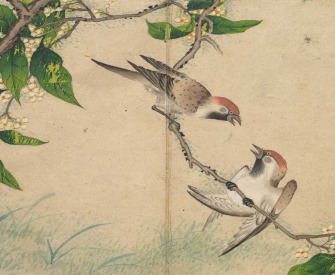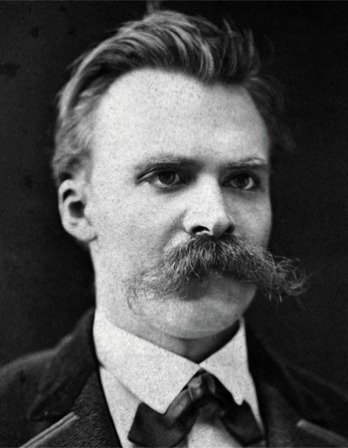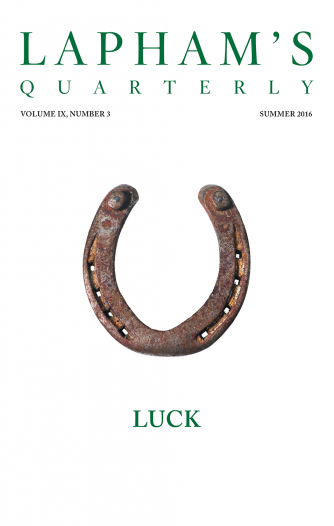My interest is in the future, because I am going to spend the rest of my life there.
—Charles F. Kettering, 1946Time Traveler
H.G. Wells examines the people of the future.
We were standing face to face, I and this fragile thing out of futurity. He came straight up to me and laughed into my eyes. The absence of any sign of fear from his bearing struck me at once. Then he turned to the two others who were following him and spoke to them in a strange and very sweet and liquid tongue.
There were others coming, and presently a little group of perhaps eight or ten of these exquisite creatures were about me. One of them addressed me. It came into my head, oddly enough, that my voice was too harsh and deep for them. So I shook my head and, pointing to my ears, shook it again. He came a step forward, hesitated, and then touched my hand. Then I felt other soft little tentacles upon my back and shoulders. They wanted to make sure I was real. There was nothing in this at all alarming. Indeed, there was something in these pretty little people that inspired confidence—a graceful gentleness, a certain childlike ease. And besides, they looked so frail that I could fancy myself flinging the whole dozen of them about like ninepins.
As they made no effort to communicate with me, but simply stood round me smiling and speaking in soft cooing notes, I began the conversation. I pointed to the Time Machine and to myself. Then, hesitating for a moment how to express time, I pointed to the sun. At once a quaintly pretty little figure in checkered purple and white followed my gesture, and then astonished me by imitating the sound of thunder.
For a moment I was staggered, though the import of his gesture was plain enough. The question had come into my mind abruptly: were these creatures fools? You may hardly understand how it took me. You see I had always anticipated that the people of the year Eight Hundred and Two Thousand odd would be incredibly in front of us in knowledge, art, everything. Then one of them suddenly asked me a question that showed him to be on the intellectual level of one of our five-year-old children—asked me, in fact, if I had come from the sun in a thunderstorm! It let loose the judgment I had suspended upon their clothes, their frail light limbs, and fragile features. A flow of disappointment rushed across my mind. For a moment I felt that I had built the Time Machine in vain.
I nodded, pointed to the sun, and gave them such a vivid rendering of a thunderclap as startled them. They all withdrew a pace or so and bowed. Then came one laughing toward me, carrying a chain of beautiful flowers altogether new to me and put it about my neck. The idea was received with melodious applause, and presently they were all running to and fro for flowers and laughingly flinging them upon me until I was almost smothered with blossom. You who have never seen the like can scarcely imagine what delicate and wonderful flowers countless years of culture had created. Then someone suggested that their plaything should be exhibited in the nearest building, and so I was led past a sphinx of white marble, which had seemed to watch me all the while with a smile at my astonishment, toward a vast gray edifice of fretted stone. As I went with them, the memory of my confident anticipations of a profoundly grave and intellectual posterity came with irresistible merriment to my mind.
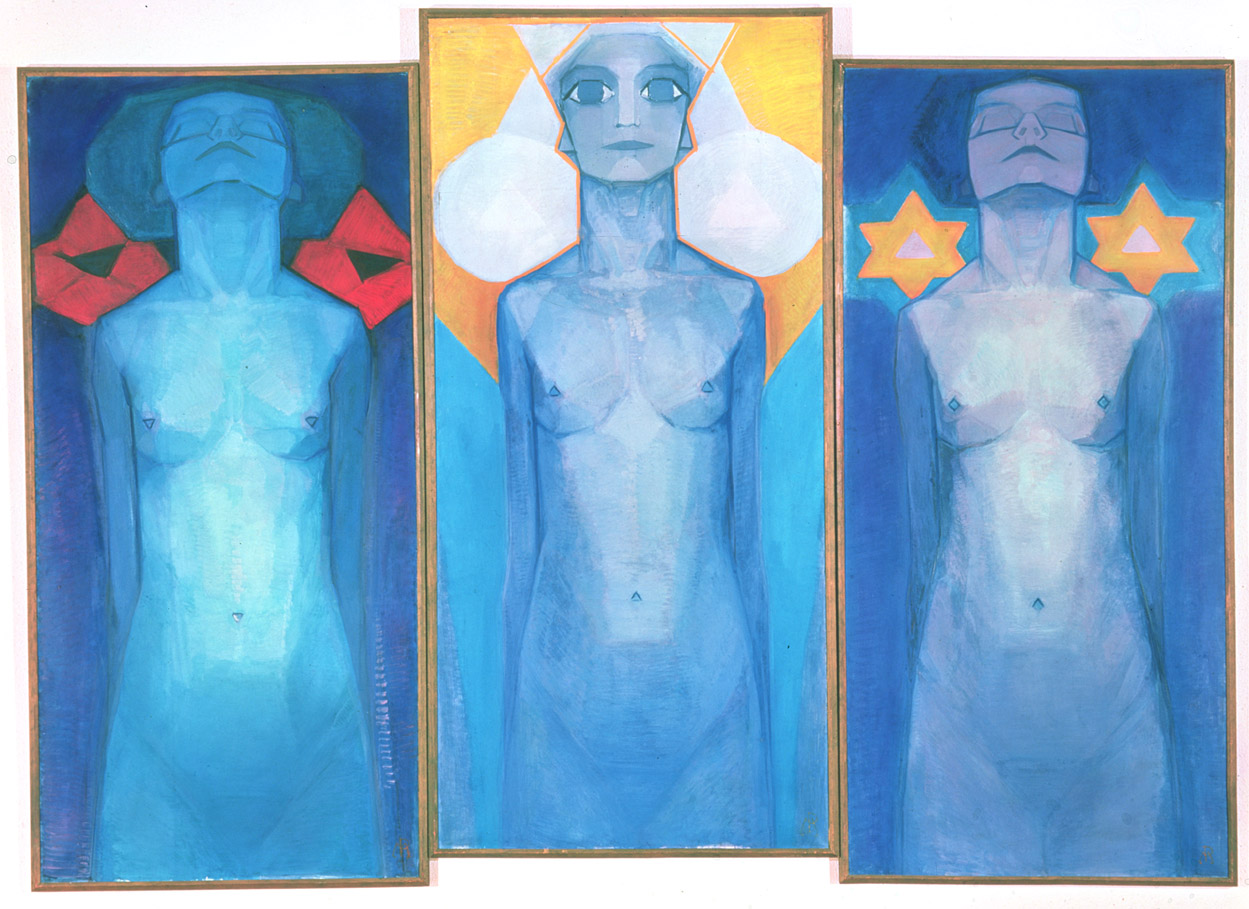
Evolution, by Piet Mondrian, 1911. Gemeentemuseum Den Haag, The Hague in the Netherlands.
The building had a huge entry and was altogether of colossal dimensions. I was naturally most occupied with the growing crowd of little people and with the big open portals that yawned before me shadowy and mysterious. My general impression of the world I saw over their heads was of a tangled waste of beautiful bushes and flowers, a long-neglected and yet weedless garden. I saw a number of tall spikes of strange white flowers, measuring a foot perhaps across the spread of the waxen petals. They grew scattered, as if wild, among the variegated shrubs, but I did not examine them closely at this time. The Time Machine was left deserted on the turf among the rhododendrons.
The arch of the doorway was richly carved, but naturally I did not observe the carving very narrowly, though I fancied I saw suggestions of old Phoenician decorations as I passed through, and it struck me that they were very badly broken and weatherworn. Several more brightly clad people met me in the doorway, and so we entered, I, dressed in dingy nineteenth-century garments, looking grotesque enough, garlanded with flowers, and surrounded by an eddying mass of bright, soft-colored robes and shining white limbs, in a melodious whirl of laughter and laughing speech.
The big doorway opened into a proportionately great hall hung with brown. The roof was in shadow, and the windows, partially glazed with colored glass and partially unglazed, admitted a tempered light. The floor was made up of huge blocks of some very hard white metal, not plates nor slabs, blocks, and it so much worn, as I judged by the going to and fro of past generations, as to be deeply channelled along the more frequented ways. Transverse to the length were innumerable tables made of slabs of polished stone, raised perhaps a foot from the floor, and upon these were heaps of fruits. Some I recognized as a kind of hypertrophied raspberry and orange, but for the most part they were strange.
Between the tables was scattered a great number of cushions. Upon these my conductors seated themselves, signing for me to do likewise. With a pretty absence of ceremony they began to eat the fruit with their hands, flinging peel and stalks and so forth into the round openings in the sides of the tables. I was not loath to follow their example, for I felt thirsty and hungry. As I did so, I surveyed the hall at my leisure.
And perhaps the thing that struck me most was its dilapidated look. The stained-glass windows, which displayed only a geometric pattern, were broken in many places, and the curtains that hung across the lower end were thick with dust. And it caught my eye that the corner of the marble table near me was fractured. Nevertheless, the general effect was extremely rich and picturesque. There were, perhaps, a couple of hundred people dining in the hall, and most of them, seated as near to me as they could come, were watching me with interest, their little eyes shining over the fruit they were eating. All were clad in the same soft, and yet strong, silky material.
Fruit, by the by, was all their diet. These people of the remote future were strict vegetarians, and while I was with them, in spite of some carnal cravings, I had to be frugivorous also. Indeed, I found afterward that horses, cattle, sheep, dogs, had followed the Ichthyosaurus into extinction. But the fruits were very delightful; one, in particular, that seemed to be in season all the time I was there—a floury thing in a three-sided husk—was especially good, and I made it my staple. At first I was puzzled by all these strange fruits, and by the strange flowers I saw, but later I began to perceive their import.
However, I am telling you of my fruit dinner in the distant future now. So soon as my appetite was a little checked, I determined to make a resolute attempt to learn the speech of these new men of mine. Clearly that was the next thing to do. The fruits seemed a convenient thing to begin upon, and holding one of these up I began a series of interrogative sounds and gestures. I had some considerable difficulty in conveying my meaning. At first my efforts met with a stare of surprise or inextinguishable laughter, but presently a fair-haired little creature seemed to grasp my intention and repeated a name. They had to chatter and explain the business at great length to each other, and my first attempts to make the exquisite little sounds of their language caused an immense amount of amusement. However, I felt like a schoolmaster amid children, and persisted—and presently I had a score of noun substantives at least at my command, and then I got to demonstrative pronouns and even the verb “to eat.” But it was slow work, and the little people soon tired and wanted to get away from my interrogations, so I determined, rather of necessity, to let them give their lessons in little doses when they felt inclined. And very little doses I found they were before long, for I never met people more indolent or more easily fatigued.
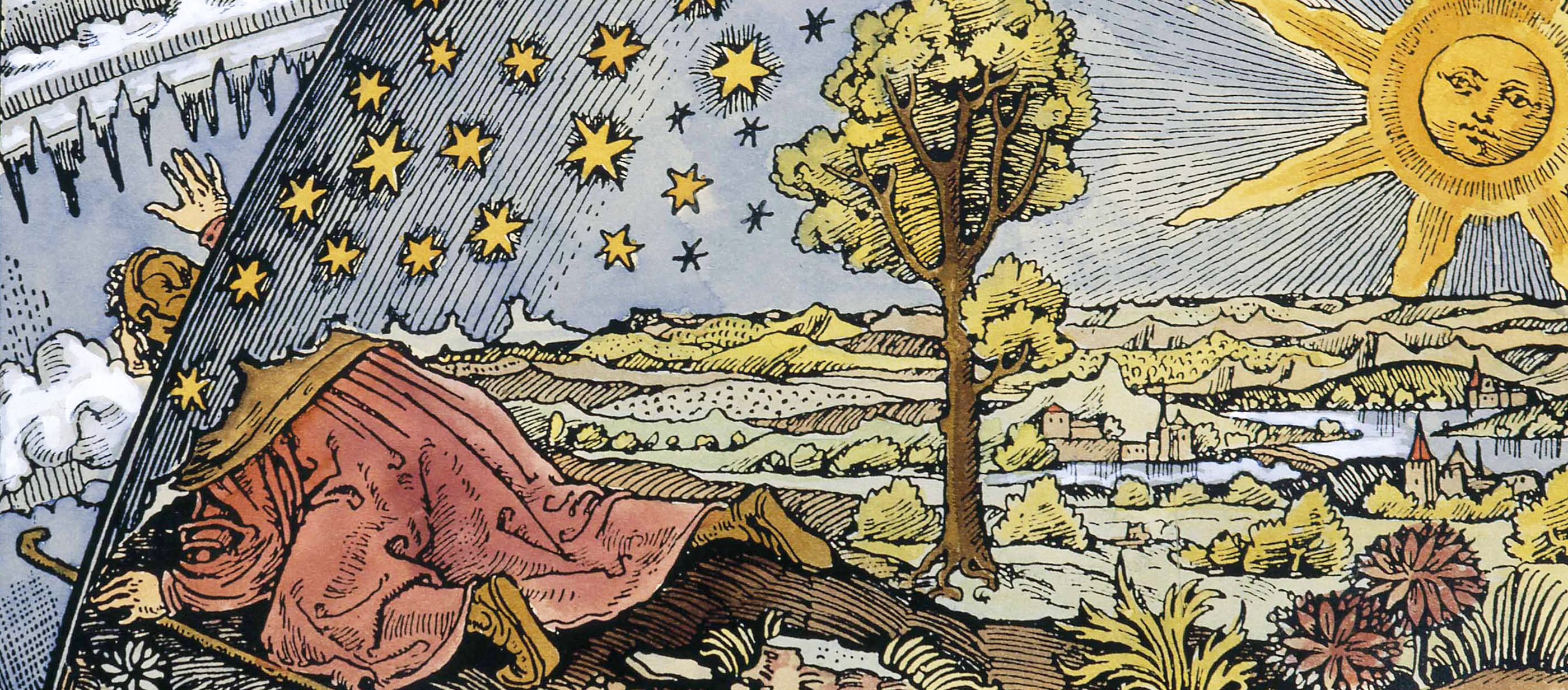
Medieval missionary discovering the point where heaven and earth meet, twentieth-century coloration of black-and-white engraving from The Atmosphere, by Camille Flammarion, 1888.
A queer thing I soon discovered about my little hosts, and that was their lack of interest. They would come to me with eager cries of astonishment, like children, but like children they would soon stop examining me and wander away after some other toy. The dinner and my conversational beginnings ended, I noted for the first time that almost all those who had surrounded me at first were gone. It is odd, too, how speedily I came to disregard these little people. I went out through the portal into the sunlit world again so soon as my hunger was satisfied. I was continually meeting more of these men of the future, who would follow me a little distance, chatter and laugh about me, and having smiled and gesticulated in a friendly way, leave me again to my own devices.
The calm of evening was upon the world as I emerged from the great hall, and the scene was lit by the warm glow of the setting sun. At first things were very confusing. Everything was so entirely different from the world I had known—even the flowers. The big building I had left was situated on the slope of a broad river-valley, but the Thames had shifted, perhaps, a mile from its present position. I resolved to mount to the summit of a crest, perhaps a mile and a half away, from which I could get a wider view of this our planet in the year Eight Hundred and Two Thousand Seven Hundred and One. For that, I should explain, was the date the little dials of my machine recorded.
It seemed to me that I had happened upon humanity upon the wane. The ruddy sunset set me thinking of the sunset of mankind. For the first time I began to realize an odd consequence of the social effort in which we are at present engaged. And yet, come to think, it is a logical consequence enough. Strength is the outcome of need; security sets a premium on feebleness. The work of ameliorating the conditions of life—the true civilizing process that makes life more and more secure—had gone steadily on to a climax. One triumph of a united humanity over nature had followed another. Things that are now mere dreams had become projects deliberately put in hand and carried forward. And the harvest was what I saw!

H.G. Wells
From The Time Machine. Receiving a spotty education in the 1880s, Wells served as a draper’s apprentice and a chemist’s assistant before winning at the age of eighteen a scholarship allowing him to study with T. H. Huxley. He published in 1893 his first book, Textbook of Biology, and in 1895 his first novel, The Time Machine. In a radio broadcast in 1938, Orson Welles adapted Wells’ War of the Worlds, convincing some Americans that Martians had landed in New Jersey.

